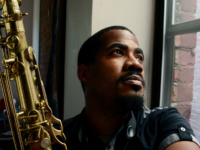Photo courtesy of Red Cat Publicity
The brilliant pianist from Cuba Aruán Ortiz made a strong positive impression to anyone who paid attention to his 2010 release Alameda, a sophisticated outing of modern jazz that eludes adequate comparisons. That album showcased a talent both deep and broad, and the accolades followed, garnering a spot on our Best Modern and Mainstream Jazz records list of 2010.
It must be hard to follow up such a terrific record with another one, but that’s just what Ortiz accomplished with the succeeding record, Orbiting. Carrying over only drummer Eric McPherson from Alameda, Ortiz formed a new quartet that also includes Rahsaan Carter (a former band mate in Wallace Roney’s combo) on bass and David Gilmore on guitar.
The presence of Gilmore represents the biggest change-up from prior Ortiz albums, because Gilmore’s guitar provides the friction that Ortiz rubs up against, pulling Ortiz out of his comfort zone and creating additional sparks. Oh, maybe Gilmore is playing along congruently on Hermeto Pascoal’s mysterious but festive “Ginga Carioca,” but after that initial track, he plays in a fusion manner that provides sharp relief to Ortiz’s acoustic modern jazz and classically trained ways.
McPherson metes out unsettled, restless rhythms, playing more to the melody than the melody is playing to him. Carter’s role in finding the pulse and direction for these loosely played harmonies makes his role more crucial over what a bassist performing advanced jazz is normally responsible for. Indeed, these songs move along a periphery drawn around the actual melody, and it often seems as if an invisible hand is guiding the four to keep a certain distance from that melody but not stray too far from it. The range is just right for constant improvising that’s truly free for everyone but doesn’t abandon the common purpose of the song.
These tenants of a typical Ortiz song show up the strongest on selections like “Orbiting” (Youtube below), “The Heir” and “Green City.” The first of these three is Gilmore at his best, tracking along with Ortiz’s single notes going down crooked paths and soloing with a dash of rock and Brazilian, changing the mood in accordance to the song’s serpentine path. “The Heir,” on the other hand, is mostly the pianist’s show, an exhibition of his classical chops played over a nervous rhythm and gradually bringing his showcase to a rousing crescendo. “Green River” begins with a gorgeous solo piano performance, joined at the end of it by Gilmore and each take turns pouring forth a stream of ideas that conform to the overall character of the shifting melody.
Even where Ortiz is covering others, it still manages to sound like these songs are his own, but what these covers serve to do is illustrate that the ancestry of his music can be traced directly to such pioneers as Charlie Parker (“Koko”) and Ornette Coleman (“WRU”), among others. “Alone Together” is Ortiz at his most delicate and sentimental, preferring to stay with the melancholy melody and let Carter undertake solo duties this time.
Orbiting, like Alameda is a jigsaw puzzle whereby it’s possible to put only so many pieces together on each listen. But it’s also different from its predecessor in that the puzzle pieces are cut differently. The completed puzzle makes a audial artwork that’s just as elegant and incisive as Aruán Ortiz’s last one.
Orbiting releases May 29 by Fresh Sound New Talent Records. Visit Aruán Ortiz’s website for more info.
[amazon_enhanced asin=”B007THVNF8″ /] [amazon_enhanced asin=”B007X0VXPG” /] [amazon_enhanced asin=”B00265DWU2″ /] [amazon_enhanced asin=”B0025X4PN8″ /] [amazon_enhanced asin=”B000F0H4R2″ /]




